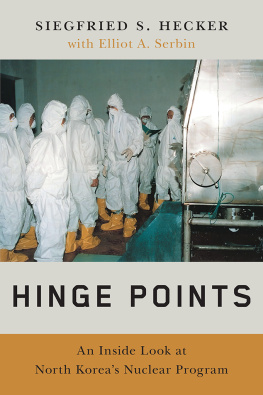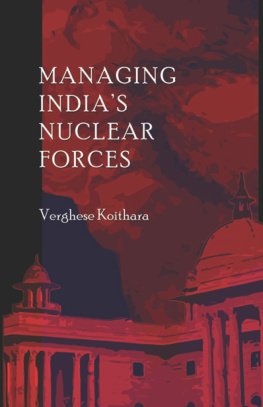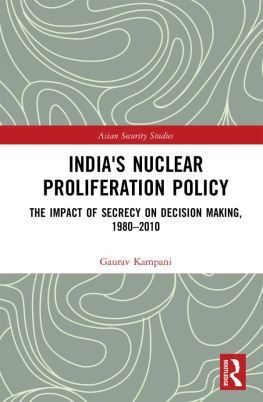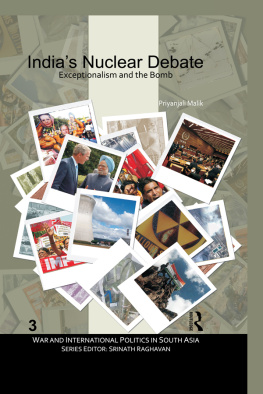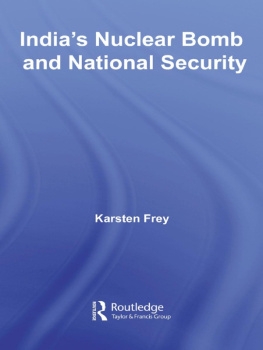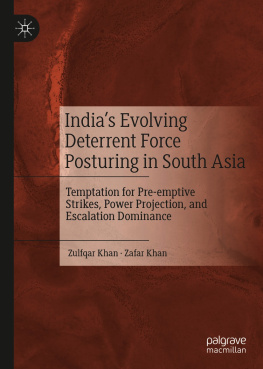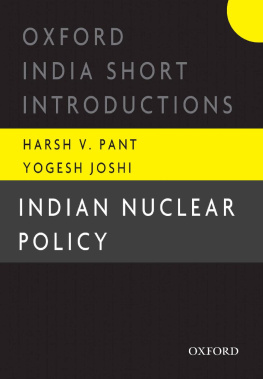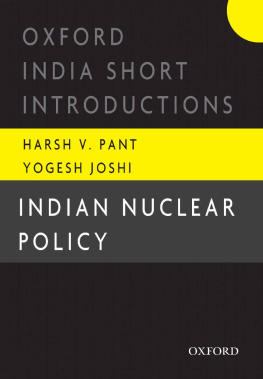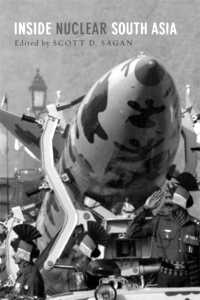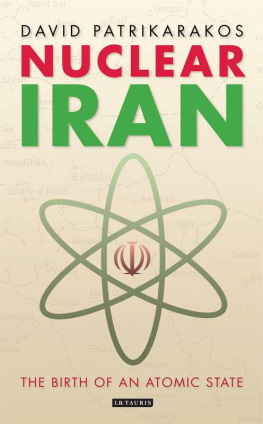PLOUGHSHARES AND SWORDS
INDIAS NUCLEAR PROGRAM IN THE GLOBAL COLD WAR
J AYITA S ARKAR
CORNELL UNIVERSITY PRESS
Ithaca and London
For Dadu, Ma, and Cheryl
C ONTENTS
M APS AND I LLUSTRATIONS
Maps
Indias key nuclear and space sites
Travancore and French colonial territories
Sikkims geopolitical significance
Illustrations
For the Future of Asia, Jugantar, December 17, 1942
Herblocks Sermon on the Mount, April 5, 1951
Jawaharlal Nehru, J. R. D. Tata, and others at TIFR, January 1, 1954
Henri Cartier-Bressons 1966 photograph of Trombay
R. K. Laxmans Wheel of Progress, January 21, 1957
Jawaharlal Nehru and Dwight D. Eisenhower at the Taj Mahal, December 13, 1959
Henri Cartier-Bressons 1966 photograph of Thumba
R. K. Laxmans Atom for Peace, November 29, 1964
Henri Cartier-Bressons 1966 photograph of Indira Gandhi at the Jaipur Congress
Raghu Rais photograph of the 1971 war
TIFRs tour by Indira Gandhi with M. G. K. Menon and Vikram Sarabhai
The mound created by Indias nuclear explosion in Pokhran, May 18, 1974
The tour of the nuclear test site by Indira Gandhi, J. R. D. Tata, and others, May 1974
A CKNOWLEDGMENTS
Location matters for the writing of history. It mattered for writing this book. Having grown up in India, I have vivid memories of the eleven nuclear weapon tests that shook South Asia in May 1998. As a young adult, I read passionate editorials in favor and against the 2008 US-India civil nuclear agreement. But, when I saw the world from the shores of Lac Lman in Switzerland, where this project began, the Mont Blanc in the horizon offered much-needed emotional and intellectual distance. It influenced this books conception, research, and writing.
The French role in Indias nuclear program first caught my attention while chatting with Robert S. Anderson (or Bob da, as he likes to be called by his Bengali friends) at Crperie des Pquis in Geneva. Since then, Bob das decade-long mentorship has been enormously fruitful for this book. Research support from 2010 to 2014 from the Graduate Institute Genevas Department of International History, a 2011 visiting fellowship at the Institute for Defence Studies and Analyses in New Delhi, the 2013 Albert Gallatin predoctoral fellowship at Yale Universitys South Asian Studies Council, a 2013 junior visiting scholarship at the Woodrow Wilson Centers History and Public Policy Program, the 2013 Moody Research Grant from the Lyndon B. Johnson Presidential Library, a 2014 fellowship from the Norwegian Institute for Defence Studies, and a 2016 research grant from the Gerald R. Ford Presidential Library facilitated research and writing for this book. Travel grants from the History of Science Society, Peace History Society, Swiss Academy of Humanities and Social Sciences, and Society for Historians of American Foreign Relations facilitated my participation at major conferences, where this project benefited from helpful feedback. The Woodrow Wilson Centers Nuclear Proliferation International History Project was a tremendous source of support.
Many individuals provided feedback and asked insightful questions that helped me to improve this book over the years. My utmost gratitude goes to Jussi Hanhimki for believing in me and to Francis J. Gavin for asking helpful questions in the early stages of this project. I am particularly grateful to Debjani Bhattacharyya, Matthew Bunn, William Burr, the late Stephen P. Cohen, Alexandre Debs, David Engerman, umit Ganguly, Michael Graziano, Gabrielle Hecht, David Holloway, Sheila Jasanoff, the late Robert Jervis, John Krige, Stuart W. Leslie, Michele Louro, Robert McMahon, Zia Mian, Steven E. Miller, Leopoldo Nuti, Christian Ostermann, Jean-Luc Racine, Srinath Raghavan, M. V. Ramana, Andrew Rotter, Asif Siddiqi, Fiona Smyth, Nina Tannenwald, and Maurice Vasse. Or Rabinowitz and Mircea Raianu shared archival documents, for which I am indebted.
At Dartmouth College, where I held a residential fellowship and hosted a book workshop in 2019, the manuscript went through extensive rewriting. In Hanover, I benefited from the encouragement of Douglas Haynes, Stefan Link, Edward Miller, Jennifer Miller, Nicholas Miller, Daryl Press, Benjamin Valentino, and William Wohlforth. Ed Miller gave me the courage to invoke technopolitics more forcefully. I would like to especially thank Elisabeth Leake, Ed Miller, Jenni Miller, and Lydia Walker, for reading several revised drafts even after the workshop. Elaine Waterman, my landlady in Norwich, Vermont, kept me on my toes during the fellowship by regularly inquiring about the book.
Feedback and help from the staff and editors at Cornell University Press and Westchester Publishing Services were significant. I am particularly thankful to my editors Sarah Grossman and Michael McGandy, production editors Susan Specter and Kristen Bettcher, and the two anonymous reviewers. Sections of the book draw on research from previously published journal articles. I am grateful to MIT Press, Oxford University Press, Sage Publishing, and Taylor & Francis for permission to reprint some of this content. An open-access book grant from the Swiss National Science Foundation made this book available to all.
No part of this research would have been possible without the help of tireless archivists in various parts of the globe. Research assistants Namara Burki and Sara Idris Hussein facilitated second looks at documents in archives in Paris and New Delhi, respectively. Jay Slagle, Angela Valente, and Tom Ware made some of the prose readable.
At Boston University, I benefited from great collegiality and support, not least from Houchang Chehabi, who shared from his personal collection a trove of 1970s newspaper clippings about India and Iran. Houchang even personally translated sections from Akbar Etemads biographies from Persian to English. Insightful questions from the students of IR377, IR315, and IR522 strengthened the books arguments. The Global Decolonization Initiatives research interns were a source of much-needed inspiration during the COVID-19 pandemic, when I completed the books final revisions.
My friends Rez Ahmed, Kranti Biswas, Pavel Chakraborty, and Smruthi Rammohan, stood by my side and made the slog bearable in Geneva, Switzerland. My spouse, Cheryl, has been inspiring me since we first met in New Haven, Connecticut. My cats, Gorky and Grieg, have been reliable assistants in Boston, Massachusetts, as I completed this book. Ma and Babas endless encouragement from Calcutta made everything possible. I remain in eternal gratitude to Dadu and Didu, my late grandparents, who taught me to stop and smell the roses, and to Cheryl, the rock of my life. To Dadu, Ma, and Cheryl, I dedicate this book.
A BBREVIATIONS
AECI | Atomic Energy Commission of India |
AECL | Atomic Energy of Canada Limited |
AEOI | Atomic Energy Organization of Iran |
BARC | Bhabha Atomic Research Centre |
BJP | Bharatiya Janata Party |
CANDU | Canada Deuterium Uranium (a reactor type) |
CEA | Commissariat lnergie atomique |
CIA | Central Intelligence Agency |
CIRUS | Canada-India Reactor with US heavy water |
CISAC | Committee on International Studies of Arms Control (American Academy) |
CSIR | Council of Scientific and Industrial Research |
DAE | Department of Atomic Energy (India) |
|
Next page

